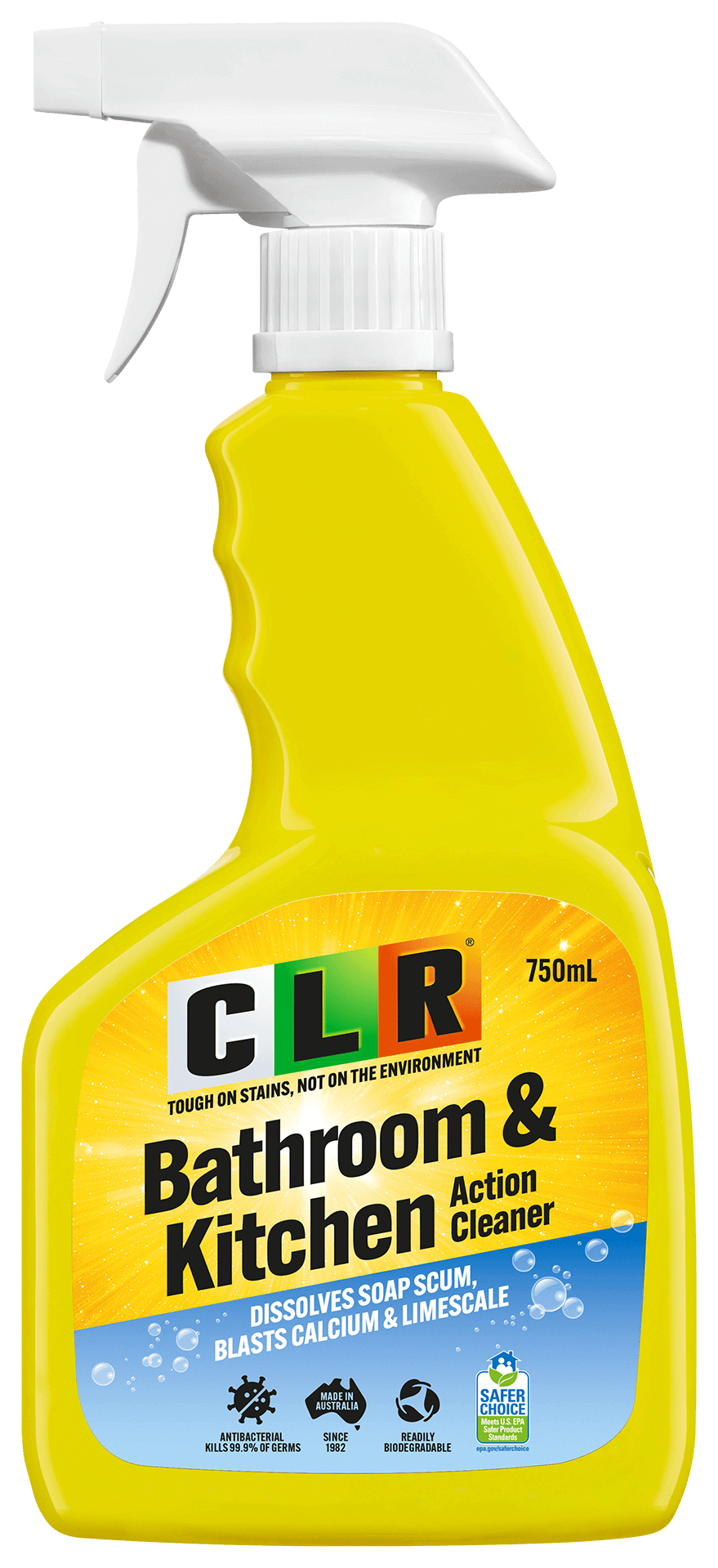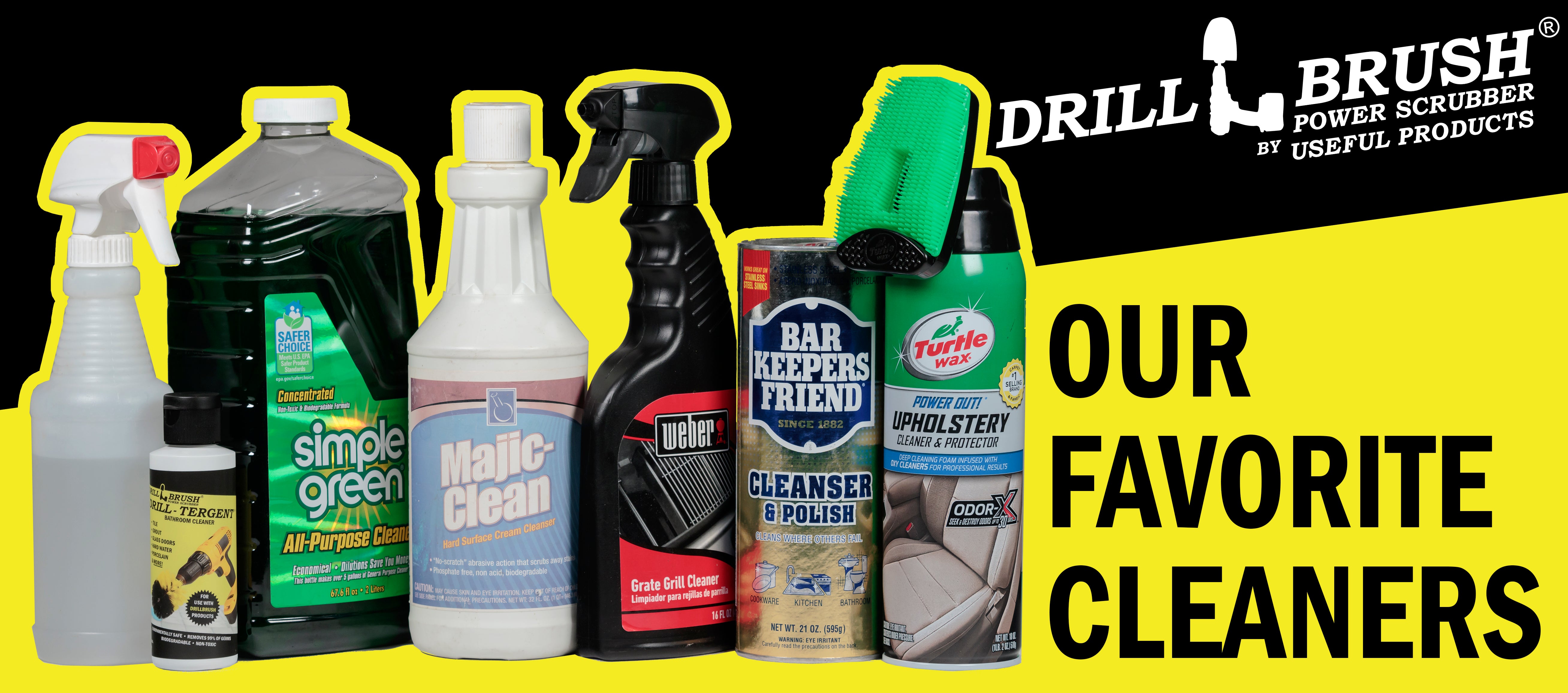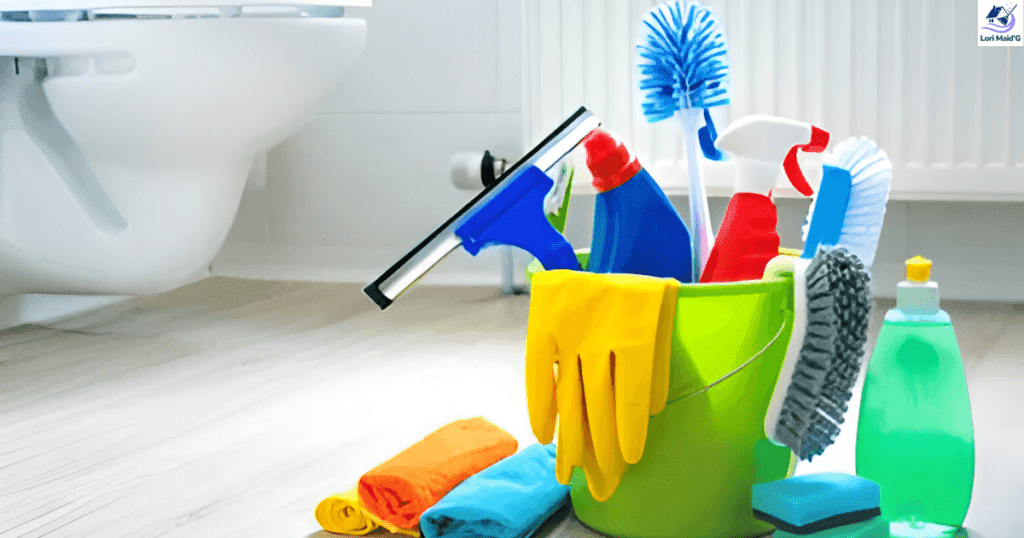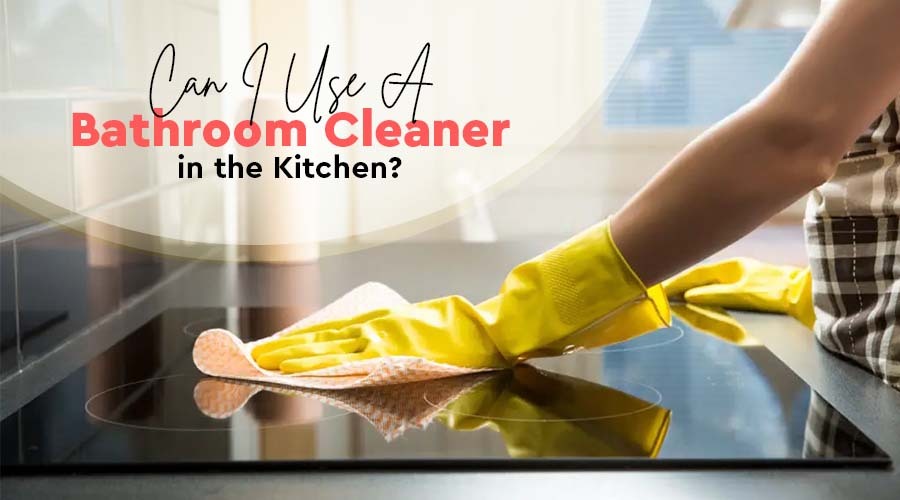Have you ever found yourself reaching for the bathroom cleaner while tidying up your kitchen? It’s easy to wonder if this convenient crossover could save you time and effort.
After all, both spaces need to be clean, and sometimes you just want to simplify your cleaning routine. But is it really safe and effective to use bathroom cleaner on kitchen surfaces? This question might seem trivial, but the answer could impact the health and safety of your home.
Discover the surprising truths behind using bathroom cleaner in the kitchen and learn what’s best for keeping your space spotless without compromising your family’s well-being. Read on to unravel the facts that every homeowner needs to know!

Credit: clrclean.com.au
Bathroom Vs Kitchen Cleaners
Different cleaners serve distinct purposes. Bathroom cleaners often contain stronger chemicals for mold and mildew. Kitchen cleaners focus on grease and food residue. Using bathroom cleaner in the kitchen might be unsafe due to harsh ingredients. Always check labels for proper usage.
When you stroll down the cleaning aisle, the sheer variety of products can be overwhelming. You might wonder if bathroom cleaners could double as kitchen cleaners. After all, they both tackle dirt and grime. But let’s delve into the differences between these two types of cleaners and whether they can be interchangeable.Understanding The Formulation
Bathroom cleaners are designed to target soap scum, hard water stains, and mildew. They often contain ingredients like bleach or ammonia. These chemicals are powerful against bathroom grime but can be overly harsh for kitchen surfaces. Kitchen cleaners, on the other hand, focus on food residue and grease. They usually contain degreasers and are formulated to be safe on surfaces where food preparation takes place.Safety Considerations
You wouldn’t want to use a cleaner with strong chemicals on your kitchen counter where you prepare food. The residues could contaminate your meals. Always check the label for food-safe certification when choosing kitchen cleaners. Think about your family and pets who might accidentally ingest traces left behind. A bathroom cleaner might be too aggressive for areas in direct contact with food.Effectiveness On Different Surfaces
Bathroom cleaners might excel in removing stubborn stains on tiles and bathtubs. However, they can damage delicate surfaces like wood or laminate often found in kitchens. Kitchen cleaners are typically gentler and designed for versatile use, ensuring they won’t harm surfaces while still effectively cleaning them.Personal Experience: The Risk I Took
Once, I used a bathroom cleaner to tackle a greasy kitchen mess. It seemed logical at the time. Unfortunately, it left a pungent odor and slight discoloration on my countertop. I learned that using the right cleaner for the right space isn’t just a marketing ploy—it’s practical advice. Would you risk damaging your kitchen surfaces for a temporary solution?Conclusion: Making The Right Choice
Next time you’re tempted to use a bathroom cleaner in the kitchen, pause for a moment. Consider the potential risks and choose a cleaner specifically designed for kitchen use. Your kitchen deserves a cleaner that respects its unique needs. Wouldn’t you agree that a little thoughtfulness can save you from unintended consequences?Chemical Composition
Understanding the chemical composition of cleaning products is crucial. It helps in determining their appropriate use. Bathroom cleaners and kitchen cleaners often have different formulations. This is due to the distinct cleaning needs in each area. Let’s delve into the common ingredients and potential hazards of bathroom cleaners.
Common Ingredients
Bathroom cleaners often contain bleach. It effectively removes stains and disinfects surfaces. Another common ingredient is ammonia. This compound cuts through grime and soap scum. Some bathroom cleaners also include acids. These acids help dissolve mineral deposits and rust. Surfactants are present too. They help in breaking down oils and dirt.
Potential Hazards
Some ingredients in bathroom cleaners can be harmful in kitchens. Bleach can leave harmful residues on kitchen surfaces. These residues may contaminate food. Ammonia fumes can irritate eyes and lungs. Mixing ammonia with other chemicals can be dangerous. Acidic substances can damage kitchen countertops. Especially those made from natural stone. Surfactants can be harsh on skin if not rinsed properly.
Cross-usage Risks
Have you ever grabbed a bottle of bathroom cleaner and considered using it in your kitchen? You might think it’s a clever way to save time and money, but mixing cleaning products can come with risks you haven’t imagined. Understanding these risks can prevent potential health concerns and damage to your kitchen surfaces.
Health Concerns
Using bathroom cleaner in your kitchen can expose you to health hazards. Bathroom cleaners are often formulated to tackle tough stains like soap scum and lime scale, which means they may contain stronger chemicals.
These chemicals can be harmful if they come into contact with food preparation areas. Think about the residue that might be left behind, potentially mixing with your next meal. It’s not just about cleanliness; it’s about safety.
Ask yourself, is saving a few bucks worth the risk of contaminating your food with chemicals? You wouldn’t want your family to ingest anything harmful, right?
Surface Damage
Bathroom cleaners can cause surface damage in your kitchen. They may be great for tiles and porcelain, but using them on different materials like wood or stainless steel can lead to unexpected consequences.
Imagine wiping down your beautiful wooden countertop only to notice discoloration or peeling over time. That’s a costly mistake you can avoid by using products designed specifically for kitchen use.
Consider how different surfaces require different care. Your kitchen deserves products that protect its aesthetics and functionality.
Next time you’re tempted to use bathroom cleaner for kitchen tasks, remember the potential for health risks and surface damage. Making informed choices can protect both your health and your home. Are you willing to take the chance?

Credit: drillbrush.com
Safety Precautions
Using bathroom cleaner in the kitchen can be risky. These cleaners may contain chemicals unsafe for food areas. Always check labels for safe use instructions.
When pondering the idea of using bathroom cleaner in your kitchen, safety should be your top priority. Mixing cleaning products and using them in unintended spaces can pose risks. Before you grab that cleaner, it’s crucial to understand the safety precautions that will protect you and your family. Let’s dive into essential steps to ensure your cleaning routine is both effective and safe.Proper Ventilation
Always ensure your kitchen is well-ventilated when using any cleaning products. Open windows and doors to allow fresh air to circulate. This prevents the build-up of potentially harmful fumes that can affect your health. Think about the last time you cleaned with strong chemicals. Did you notice how the smell lingered? Proper ventilation helps in avoiding such discomfort.Protective Gear
Wearing protective gear is a simple yet effective way to safeguard your skin and eyes. Use gloves to prevent direct contact with harsh chemicals. Goggles are also a good idea to avoid accidental splashes. Imagine accidentally splashing cleaner in your eyes. The discomfort and potential harm are not worth the risk. A pair of gloves and goggles can make all the difference. Consider this: is a few minutes of preparation worth the safety of your skin and eyes? Yes, it absolutely is. Always have protective gear on hand for a safer cleaning experience. Remember, safety isn’t just about avoiding accidents. It’s about making conscious choices that protect your health. What other safety measures do you prioritize in your cleaning routine?Alternative Cleaning Solutions
Is bathroom cleaner safe for kitchen use? Consider safety and chemical ingredients before using it. Kitchen surfaces may need gentler, food-safe options to ensure cleanliness without contamination. Choose cleaners specifically designed for kitchen areas to maintain hygiene and safety.
Cleaning your kitchen is vital for maintaining a healthy home, but can you really swap your bathroom cleaner for kitchen use? While it might be tempting to use one product for multiple areas, there are alternative cleaning solutions that can be safer and more effective. Let’s dive into some options that might surprise you and keep your kitchen sparkling without the risk of using bathroom-specific cleaners.Natural Cleaners
Natural cleaners are a fantastic alternative to traditional cleaning products. They are often safer for your family and the environment. Vinegar, for instance, is a powerhouse in the kitchen. It cuts through grease and grime effortlessly. Mix equal parts of vinegar and water in a spray bottle, and you’ve got a handy cleaner that tackles countertops and appliances. Baking soda is another versatile option. It acts as a gentle abrasive and deodorizer. Sprinkle baking soda on surfaces, scrub with a damp cloth, and watch stains disappear. It’s perfect for tackling stubborn spots without harsh chemicals. These natural options are not only effective but can also save you money. Many people find that they already have these ingredients in their pantry, ready to be used.Multi-purpose Products
Why clutter your cabinet with multiple cleaners when you can opt for multi-purpose products? These are designed to work in various areas, including both kitchens and bathrooms. One popular choice is castile soap. This vegetable-based soap is excellent for different surfaces. Dilute it with water, and it can clean dishes, countertops, and even floors. Its gentle nature makes it ideal for those who prefer fewer chemicals in their homes. Another option is all-purpose cleaner sprays. Brands like Method or Seventh Generation offer products that are safe for kitchen use and effective in bathrooms. They simplify cleaning by allowing you to use one bottle for multiple tasks. These products offer convenience and efficiency, allowing you to spend less time choosing the right cleaner and more time enjoying your sparkling kitchen. — Have you ever tried using natural ingredients or multi-purpose cleaners in your kitchen? If not, it might be time to rethink your cleaning strategy. Choosing the right cleaner can make a big difference in how you maintain your home.Tips For Safe Usage
Using bathroom cleaner in the kitchen requires careful attention. It’s important to ensure safety and effectiveness. While bathroom cleaners can tackle tough grime, their composition may differ. Understanding how to use them safely in a kitchen setting is crucial. Let’s explore some essential tips for safe usage.
Reading Labels
Check labels on all cleaning products before use. Labels provide vital information. Look for warnings and usage instructions. Many bathroom cleaners contain strong chemicals. Ensure they are safe for kitchen surfaces. Some cleaners may not be food-safe. This could lead to contamination. Always prioritize products labeled safe for kitchen use.
Storage Guidelines
Proper storage is essential for safety. Store cleaners in a cool, dry place. Keep them out of reach of children and pets. Ensure lids are tightly sealed. This prevents spills and evaporation. Avoid storing near food items. Separate cleaning supplies from kitchen ingredients. This reduces the risk of accidental mixing.

Credit: milwaukeelorimaid.com
Frequently Asked Questions
Is Bathroom Cleaner Safe For Kitchen Use?
Bathroom cleaners are not suitable for kitchen use. They contain harsh chemicals that can contaminate food surfaces. Always use kitchen-specific cleaners to ensure safety and hygiene.
Can Bathroom Cleaner Damage Kitchen Surfaces?
Yes, bathroom cleaners can damage kitchen surfaces. They may cause discoloration or corrosion on countertops and appliances. Always choose cleaners formulated for kitchen use to preserve surfaces.
What Are The Ingredients In Bathroom Cleaner?
Bathroom cleaners often include bleach, ammonia, and acids. These ingredients are effective for bathroom grime but can be harmful in kitchen areas. Use kitchen-friendly alternatives for safer cleaning.
Can Bathroom Cleaner Affect Food Safety?
Bathroom cleaner can compromise food safety. Residues from harsh chemicals can linger on surfaces, posing health risks. Use cleaners designed for kitchen use to ensure safe food preparation.
Conclusion
Choosing the right cleaner for your kitchen is crucial. Bathroom cleaners might seem handy, but they aren’t safe for food areas. Different surfaces require different care. Using the wrong cleaner can cause harm. Chemicals in bathroom cleaners might contaminate food.
Always read labels before use. Opt for kitchen-specific cleaners to ensure safety. These products are designed for cooking spaces. Keep your family safe by using appropriate products. Your kitchen deserves the best care. Stay informed and make smart choices. Clean wisely and protect your health.

As the chief content writer, Hassan Al Sarker works as a professional kitchen-based content creator at Kitchen Liker.
In addition to reviewing the content published on Kitchen Liker, he ensures that it is accurate, relevant, and helpful. As a result, all the reviews and information published at Kitchen Liker are neutral and userfriendly.
Hassan Al Sarker has a bachelor’s degree in Hotel and Tourism Management From the Newyork University. Before joining Kitchen Liker, he was a contributor at Kitchen Club, United States.

